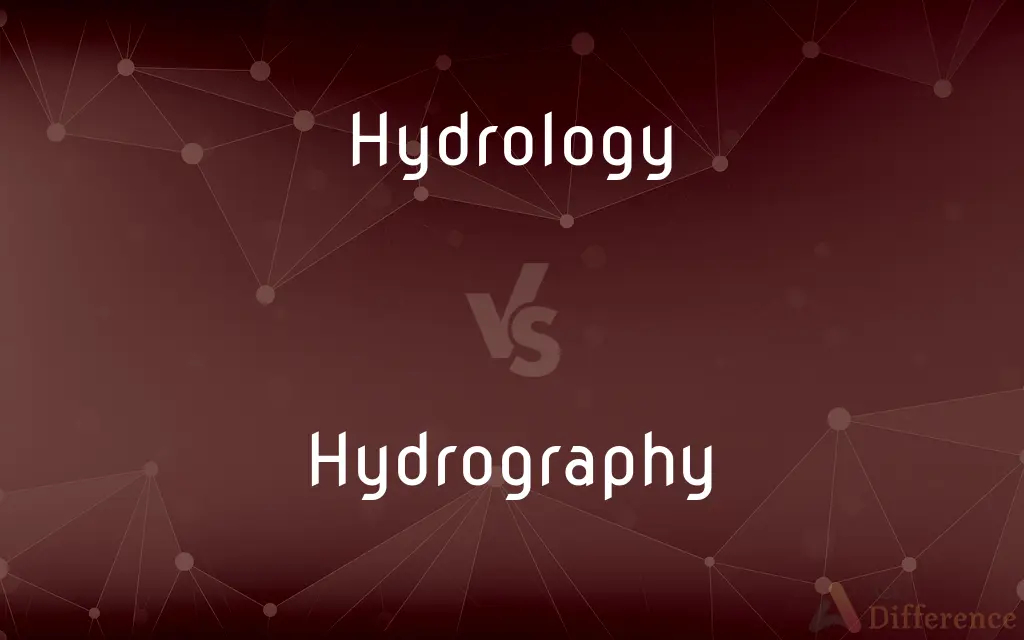Hydrology vs. Hydrography — What's the Difference?
By Fiza Rafique & Urooj Arif — Updated on April 1, 2024
Hydrology studies the movement, distribution, and quality of water on Earth, whereas hydrography focuses on measuring and describing the physical features of bodies of water.

Difference Between Hydrology and Hydrography
Table of Contents
ADVERTISEMENT
Key Differences
Hydrology is a branch of environmental science and geography that focuses on the study of water across the Earth's surface, including its distribution, circulation, and properties, primarily concerning the water cycle, water resources, and environmental watershed sustainability. Hydrography, on the other hand, is a branch of applied sciences that deals with the measurement and description of the physical features of oceans, seas, coastal areas, lakes, and rivers, as well as with predicting water-related changes over time.
While hydrology is concerned with understanding the processes and patterns of water in nature, including precipitation, evaporation, water flow, and groundwater movement, hydrography focuses more on mapping and charting water bodies to support navigation, engineering, and environmental management. This includes creating nautical charts, studying tides and currents, and ensuring safe maritime navigation.
Hydrologists often work on projects related to water quality, water supply, flood forecasting, and drought management, applying their knowledge to solve problems related to water scarcity, pollution, and the impact of climate change on water resources. Hydrographers, whereas, contribute to maritime safety by providing data for the creation of nautical charts, conducting seabed surveys, and analyzing coastal processes, which are essential for shipping, fishing, and offshore oil and gas exploration.
An important distinction between the two fields is their approach to water. Hydrology takes a broader ecological perspective, focusing on water as a crucial component of Earth's ecosystems, while hydrography adopts a more technical and navigational focus, emphasizing the physical dimensions and safe use of water bodies.
Despite their differences, hydrology and hydrography are complementary fields. The data and insights from hydrographic surveys can inform hydrological studies, especially those related to the impact of bodies of water on surrounding environments and climate. Conversely, hydrological research can provide important context for hydrographic projects, such as understanding sediment transport or the implications of changing water cycles on navigational routes.
ADVERTISEMENT
Comparison Chart
Definition
The study of water's movement, distribution, and quality on Earth.
The measurement and description of the physical features of bodies of water.
Focus
Water cycle, resources, and watershed sustainability.
Mapping and charting water bodies for navigation and engineering.
Key Activities
Analyzing water flow, quality, and availability.
Creating nautical charts, studying tides and currents.
Professional Role
Water resource management, flood forecasting, pollution control.
Ensuring maritime safety, supporting navigation and marine construction.
Approach
Ecological perspective on water within the environment.
Technical focus on physical dimensions and use of water bodies.
Compare with Definitions
Hydrology
Studies the distribution and movement of Earth's water.
Hydrologists examine how rainfall contributes to river flows.
Hydrography
Involves mapping water bodies for navigation.
Hydrographers chart coastlines to facilitate safe shipping.
Hydrology
Deals with water-related hazards.
Predicting floods to mitigate potential damage to communities.
Hydrography
Studies the physical characteristics of water bodies.
Analyzing seabed composition for offshore construction projects.
Hydrology
Focuses on water quality and availability.
Researching groundwater contamination to ensure safe drinking water.
Hydrography
Contributes to maritime safety.
Surveying shipping lanes to identify hazards.
Hydrology
Involves managing water resources.
Developing strategies for sustainable water use in agriculture.
Hydrography
Supports maritime and coastal engineering.
Providing data for the design of ports and coastal defenses.
Hydrology
Addresses environmental impacts.
Assessing the effects of climate change on water cycles.
Hydrography
Aids in environmental monitoring.
Tracking changes in tidal patterns due to climate change.
Hydrology
Hydrology (from Greek ὕδωρ, hýdōr meaning "water" and λόγος, lógos meaning "study") is the scientific study of the movement, distribution, and management of water on Earth and other planets, including the water cycle, water resources, and environmental watershed sustainability. A practitioner of hydrology is called a hydrologist.
Hydrography
Hydrography is the branch of applied sciences which deals with the measurement and description of the physical features of oceans, seas, coastal areas, lakes and rivers, as well as with the prediction of their change over time, for the primary purpose of safety of navigation and in support of all other marine activities, including economic development, security and defense, scientific research, and environmental protection.
Hydrology
The scientific study of the properties, distribution, and effects of water on the earth's surface, in the soil and underlying rocks, and in the atmosphere.
Hydrography
The scientific description and analysis of the physical conditions, boundaries, flow, and related characteristics of the earth's surface waters.
Hydrology
The science of the properties, distribution, and effects of water on a planet's surface, in the soil and underlying rocks, and in the atmosphere
Hydrography
The mapping of bodies of water.
Hydrology
The properties, distribution, and flows of water in a specific locale; the hydrological characteristics of a particular place or region.
Hydrography
(nautical) The scientific measurement and description of the physical features and conditions of navigable waters and the shoreline.
Hydrology
The science of water, its properties, phenomena, and distribution over the earth's surface.
Hydrography
The art of measuring and describing the sea, lakes, rivers, and other waters, with their phenomena.
Hydrology
The branch of geology that studies water on the earth and in the atmosphere: its distribution and uses and conservation
Hydrography
That branch of surveying which embraces the determination of the contour of the bottom of a harbor or other sheet of water, the depth of soundings, the position of channels and shoals, with the construction of charts exhibiting these particulars.
Hydrography
The science of the measurement and description and mapping of the surface waters of the earth with special reference to navigation
Common Curiosities
How do hydrologists and hydrographers work together?
Hydrologists and hydrographers often collaborate, with hydrographers providing detailed mappings that hydrologists use for environmental and water resource management.
Why is hydrology important?
Hydrology is crucial for managing water resources, predicting water-related disasters, and understanding the impacts of climate change on water cycles.
What is the main difference between hydrology and hydrography?
Hydrology focuses on studying water's distribution, movement, and quality on Earth, while hydrography centers on the measurement and description of water bodies' physical features.
Can hydrography affect hydrology?
Yes, hydrographic data on sea levels, tides, and currents can influence hydrological models, especially in coastal and estuarine studies.
What role does hydrography play in navigation?
Hydrography is essential for safe navigation, providing accurate charts and data on water depths, hazards, and maritime features.
How does climate change impact both fields?
Climate change affects hydrology by altering precipitation patterns and water availability, while hydrography must adapt to changing sea levels and navigational routes.
What kind of projects might a hydrologist and a hydrographer work on together?
They could collaborate on projects like coastal erosion studies, the impact assessment of sea-level rise on freshwater systems, or the development of integrated water management plans.
What technologies are commonly used in hydrography?
Sonar systems, satellite imagery, and GPS are key technologies in hydrography for mapping and surveying water bodies.
What are some challenges in hydrology?
Hydrologists face challenges in predicting floods and droughts accurately, managing scarce water resources, and mitigating the effects of pollution.
How do hydrographers contribute to environmental protection?
By mapping habitats and monitoring changes in water bodies, hydrographers support conservation efforts and help manage marine and coastal ecosystems.
Share Your Discovery

Previous Comparison
Creator vs. Artist
Next Comparison
Ceefax vs. TeletextAuthor Spotlight
Written by
Fiza RafiqueFiza Rafique is a skilled content writer at AskDifference.com, where she meticulously refines and enhances written pieces. Drawing from her vast editorial expertise, Fiza ensures clarity, accuracy, and precision in every article. Passionate about language, she continually seeks to elevate the quality of content for readers worldwide.
Co-written by
Urooj ArifUrooj is a skilled content writer at Ask Difference, known for her exceptional ability to simplify complex topics into engaging and informative content. With a passion for research and a flair for clear, concise writing, she consistently delivers articles that resonate with our diverse audience.
















































